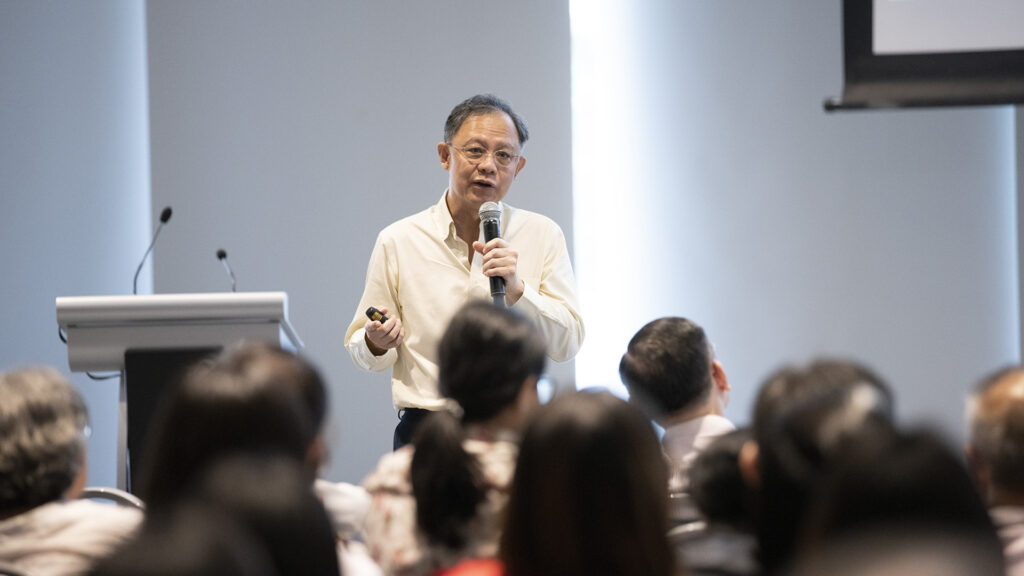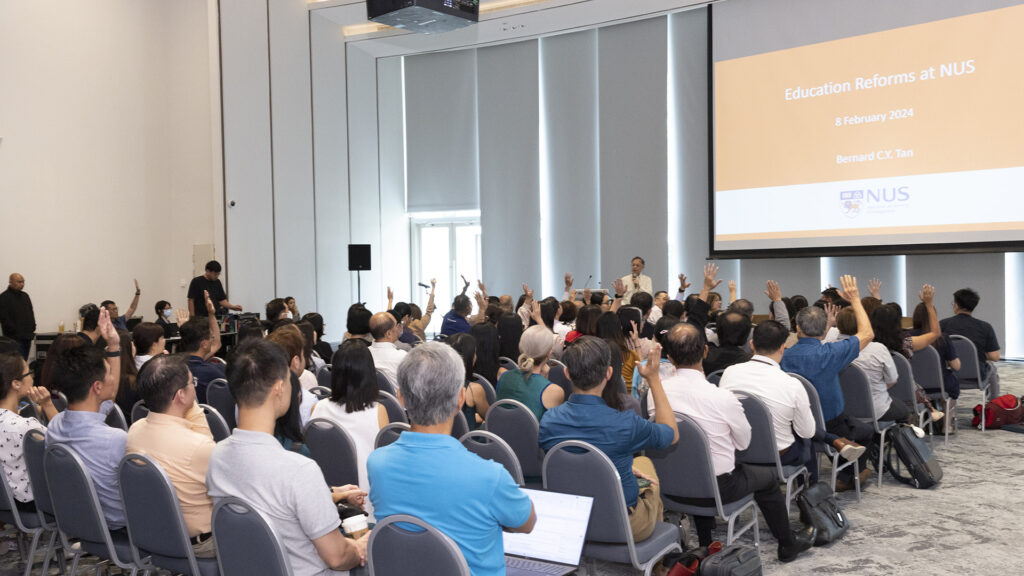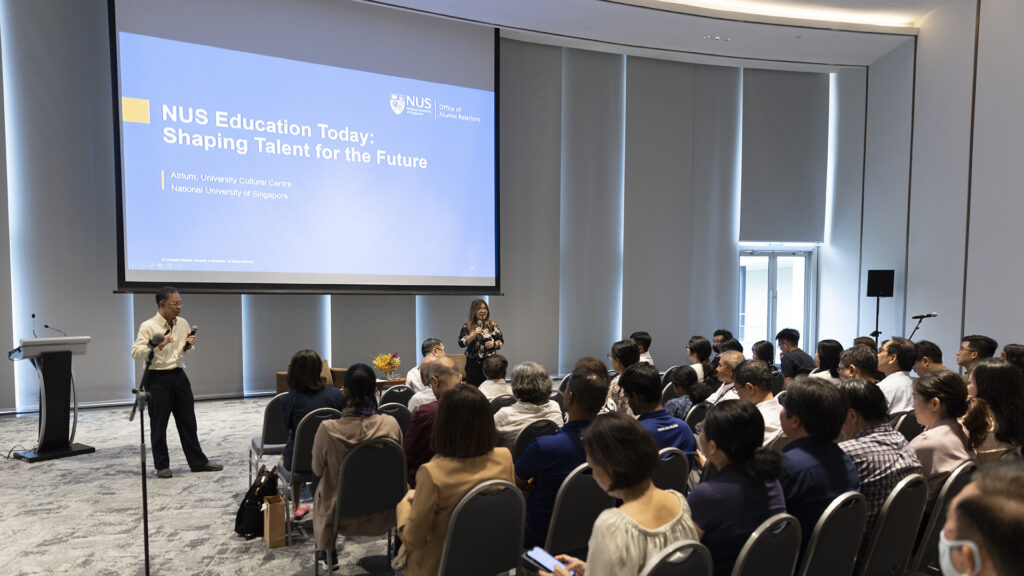How an NUS Education Prepares Undergraduates to Thrive in the Workplace of the Future
March 22, 2024
IN BRIEF | 5 min read
- Ensuring that an NUS undergraduate education equips all graduates with the skills to thrive in an ever-changing Industry 4.0 workplace has been the driving force behind the University’s education reforms.

The pursuit of interdisciplinary learning raises the issue of whether graduates will have broad exposure at the expense of disciplinary depth. While this issue may seem more pertinent for professional degree holders, such as engineers, lawyers, or doctors, ensuring that an NUS undergraduate education equips all graduates with the skills to thrive in an ever-changing Industry 4.0 workplace has been the driving force behind the University’s education reforms.
Speaking at a dialogue hosted by the NUS Office of Alumni Relations titled “NUS Education Today: Shaping Talent for the Future” on 8 February 2024, Professor Bernard Tan, NUS Senior Vice Provost (Undergraduate Education), emphasised that the future ever-changing workplace demands that students have broader training.
Undergraduates at NUS today will take fewer major courses than previous cohorts following the enhancement of General Education, which equips students with data and digital literacy competencies, and the introduction of Faculty-based interdisciplinary core courses in the curriculum. These changes are part of an educational approach that has pivoted from a model of providing students with comprehensive knowledge in their major, to one that gives students a strong foundation in their major and enables them to upskill and reskill through continuing education.
“Helping our students to get a good first job is a very good start, but we also need to find a way to sustain our graduates throughout their careers,” said Prof Tan. “Given that most of our graduates will be disrupted throughout their careers, we want to help them to prevail by pivoting to other roles within their industry, or even across industries, whenever they are disrupted,” he added. Emerging technologies, including artificial intelligence, will transform industries and bring about such disruptions to jobs.
The introduction of Faculty-based interdisciplinary core courses – such as the courses in the common curriculum for the College of Humanities and Sciences and the College of Design and Engineering – prepares students to deal with complex problems and conceive solutions that transcend the boundaries of disciplines. Doing so will equip students with more relevant skills for longer careers in the future workplace, he explained.
All these curriculum changes come with their own challenges, which NUS has been resolving with practical and, at times, novel solutions.

Enhanced Curriculum Aligned with Industry Demands
To deliver a broad-based, flexible, and interdisciplinary curriculum, the major requirement had to be condensed to 15 courses (for most majors) that would cover core knowledge and competencies for the discipline. But students can also pick up pertinent professional knowledge and competencies beyond their major. For instance, Engineering students can now pick up knowledge and skills on design thinking and sustainability through their interdisciplinary common curriculum. These curriculum changes were made in consultation with relevant professional bodies.
Meanwhile, the unrestricted elective component enables students to choose greater depth through specialisation or greater breadth through a second major or minor. Those who choose depth can later return to the University to broaden through continuing education. Likewise, those who choose breadth can later return to the University to deepen through continuing education. Prof Tan emphasised that this is a “no dead-end” education model.
Similarly, the NUS Faculty of Law has also provided greater flexibility in its curriculum by creating an unrestricted elective component that allows students to broaden through a second major or minor. “Five to 10 years ago, this would have been unthinkable,” he said of these changes, which would allow graduates to function more effectively in the legal profession.
The University has also moved to ensure that undergraduates in the health sciences disciplines (Medicine, Dentistry, Nursing and Pharmacy) are prepared to confront future healthcare challenges, such as an ageing population and the increasing use of data and digital technologies in healthcare. The launch of the nationwide Healthier SG in 2023 prompted a shift in the healthcare curriculum to embrace preventive healthcare and ageing-in-place, resulting in the new Common Curriculum for Healthcare Professional Education.
To make room for the common healthcare curriculum, the existing medical curriculum had to be whittled down, mainly by completely restructuring the first two years of the curriculum.

Stretching Skill Sets
Since the College of Humanities and Sciences comprising the Faculty of Arts and Social Sciences and the Faculty of Science was launched in 2020, students of each Faculty are required to take a broad spectrum of courses in the common curriculum. Science students are required to take humanities courses and Arts students are required to take scientific inquiry courses, making them more well-rounded. When they are disrupted in their careers, this training would give them more options to pivot to other roles within their industry, before they have to consider pivoting to other industries, he explained.
The event also included a question-and-answer session moderated by NUS Chief Alumni Officer Ms Ovidia Lim-Rajaram, where Prof Tan spoke about how he and many colleagues examined what they knew about the future workplace as they worked backwards to derive the curriculum enhancements needed.
Prof Tan, a Computing professor, shared that as part of the curriculum revision efforts, he attended various courses on humanities, social sciences, design, sustainability, health sciences, among others, as a “student”. It proved to be a chastening experience. “Some colleagues teaching these courses told me I may just fail if I sit for their exams,” he said, chuckling. He encouraged everyone not to be afraid of taking difficult courses as the learning experience will be enriching.
This story first appeared in NUSNews on 22 March 2024.

